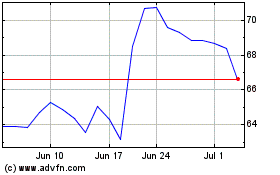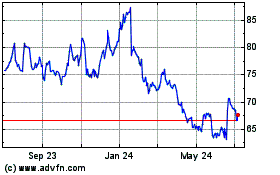All Remdesivir Supplies to Be Distributed in U.S. by Maker Gilead Sciences
October 01 2020 - 2:29PM
Dow Jones News
By Joseph Walker
The U.S. government is relinquishing control over supplies of
remdesivir, the Covid-19 drug made by Gilead Sciences Inc. that had
been in shortage since it was authorized for emergency use in
May.
Starting Thursday, Gilead will sell the drug directly to
hospitals in the same way it does other medicines based on market
demand, the Department of Health and Human Services and the company
said.
Gilead also said it is now able to meet current and future U.S.
demand for remdesivir, which is sold under the brand-name Veklury,
even in a potential worst-case scenario where there are large
spikes in cases in the fall.
"We are in a position now that we will have sufficient supply of
Veklury in the U.S. to treat all eligible hospitalized patients,"
said Johanna Mercier, Gilead's chief commercial officer, in an
interview.
Remdesivir is among only a few drugs that have been shown to
treat Covid-19 and were cleared by the U.S. Food and Drug
Administration for such use.
The drug was authorized for emergency use on May 1, after a
clinical trial showed it speeded up patients' recovery time in the
hospital by about four days. So far, the drug hasn't been shown to
reduce deaths.
Since the authorization, HHS has allocated limited supplies to
states based on hospitalization rates. States were, in turn,
responsible for allocating the drug to specific hospitals, with the
help of wholesale distributor AmerisourceBergen Corp.
Shortages frustrated some doctors and hospital officials, who
complained they weren't getting enough supply to treat all the
patients they could. Doctors and hospitals also complained that the
health department wasn't transparent enough about how it allocated
supplies, which created uncertainty around how much they should
use.
Gilead raced to ramp up its manufacturing capacity. When the new
coronavirus was identified in January, the company only had the
doses it made to study the drug as an Ebola treatment and hadn't
yet optimized the process for manufacturing it at large-scale.
Supplies and distribution improved over time, though many
hospitals continued to face challenges giving the drug to all their
Covid-19 patients, The Wall Street Journal reported.
In recent weeks, Gilead's remdesivir inventory has risen as
demand for the drug remained steady or declined slightly in the
U.S., said Ms. Mercier.
The company has ramped up manufacturing capacity, according to
Ken Kent, Gilead's senior vice president for chemical development
and manufacturing. He said the company cut the time to make the
drug to six months from a year.
"I don't know if we can do it any faster," Mr. Kent said in an
interview.
Gilead has applied to have remdesivir receive a full approval
from the Food and Drug Administration, Ms. Mercier said.
Gilead charges $3,120 per treatment for the typical patient in
the U.S. Beginning in 2021, Gilead will distribute the drug through
additional wholesalers, including McKesson Corp. and Cardinal
Health Inc., Ms. Mercier said.
In other high-income countries outside the U.S., Gilead charges
about $2,340 per treatment course. Within the coming weeks, Gilead
hopes to be able to meet demand in other high-income countries such
as France and Spain where infections are rising, Ms. Mercier
said.
Write to Joseph Walker at joseph.walker@wsj.com
(END) Dow Jones Newswires
October 01, 2020 14:14 ET (18:14 GMT)
Copyright (c) 2020 Dow Jones & Company, Inc.
Gilead Sciences (NASDAQ:GILD)
Historical Stock Chart
From Mar 2024 to Apr 2024

Gilead Sciences (NASDAQ:GILD)
Historical Stock Chart
From Apr 2023 to Apr 2024
